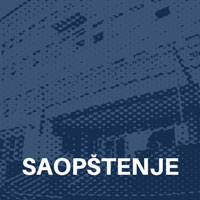Why are war crimes trials in Serbia conducted away from the public eye?
 The President of the Higher Court in Belgrade prohibited the Humanitarian Law Center (HLC) from recording the public announcement of the first instance judgment in the Beli Manastir Case, without offering valid reasons for such a decision. This decision of the President of the Court represents a continuation of the practice of courts in Serbia of limiting public access to war crimes trials, thus significantly diminishing chances for a social dialogue and dealing with the crimes committed during 1990’s.
The President of the Higher Court in Belgrade prohibited the Humanitarian Law Center (HLC) from recording the public announcement of the first instance judgment in the Beli Manastir Case, without offering valid reasons for such a decision. This decision of the President of the Court represents a continuation of the practice of courts in Serbia of limiting public access to war crimes trials, thus significantly diminishing chances for a social dialogue and dealing with the crimes committed during 1990’s.
The HLC filed a request on May 26th, 2015 to the President of the Higher Court in Belgrade asking for approval for recording the public announcement of the judgment rendered in the Beli Manastir (Zoran Vukšić et al.) Case scheduled for May 29th, 2015. The HLC stated that the basis for its request lies in the Law on the organization and competence of government authorities in war crimes proceedings, which prescribes that the President of the Court, upon obtaining the opinion of the parties to the proceedings, may grant permission for the recording of the main trial. In his response dated May 28th, 2015, the President of the Higher Court in Belgrade, Aleksandar Stepanović, only stated that the recording of the announcement of the judgment is not granted without offering a single reason for such a decision.
The Law on the organization and competence of government authorities in war crimes proceedings does not require that the decision on the prohibition of the recording of a trial contains the explicit reasoning for such a decision. However, a well-reasoned court decision represents an incontestable standard for the rule of law and the human right to a fair trial. As the European Court of Human Rights has stated in its practice: It is only by giving a reasoned decision that there can be public scrutiny of the administration of justice. Also, the Criminal Procedure Code (Article 365) prescribes that the panel’s ruling on the exclusion of the public must be reasoned and made public. Since the prohibition of the recording of public trials, essentially represents a form of exclusion of the public from trials, the relevant provision of the Code should have been applied in this case as well.
By the amendments to the Law on the organization and competence of government authorities in war crimes proceedings from 2009, the process of recording has been facilitated in such cases compared to other court cases, particularly because the need for the public to be informed about the facts and evidence on the war crimes committed has been recognized. However, for more than 12 years of prosecution of war crimes in Serbia, the public has not had an opportunity to see a single testimony provided by the victims, perpetrators or witnesses of war crimes who have participated in these cases, or the announcement of a judgment. Unlike in Serbia, war crimes trials in Bosnia and Herzegovina and Croatia are regularly recorded and broadcast on public information networks.
Apart from the prohibition on broadcasting and recording war crimes trials, public access to the cases of war crimes is also unlawfully limited by the so-called anonymization of judgments in these cases – that is to say, by blacking out certain information for the purpose of the alleged protection of personal information. In practice, anonymization results in the excessive redaction of information, which often includes the names of the accused, victims, witnesses and even lawyers, judges, and expert witnesses, as a result of which the judgments in the cases of war crimes are impossible to read and inaccessible to the public. The Commissioner for Information of Public Importance has assessed that such practice represents an excessive processing of personal information, which is prohibited by the law.
For more information about the practice of anonymization and the presentation of war crimes trials in public, please read the Analysis of the prosecution of war crimes trials in Serbia.





